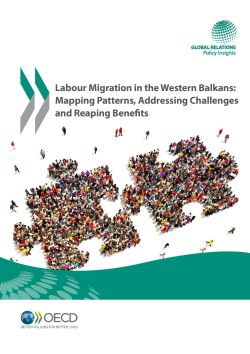Labour Migration

Emigration from the six Western Balkan economies (Albania, Bosnia and Herzegovina, Kosovo*, Montenegro, North Macedonia and Serbia) has been significant for decades, which has generated a large diaspora. In 2020, more than one in five citizens born in the region lived abroad, predominantly in a handful of OECD countries. This trend is likely to continue - especially among young people. While sustained high emigration levels, especially of young talents, can pose severe development challenges, the large and growing diaspora also provides opportunities for the region.
The report Labour Migration in the Western Balkans: Mapping Patterns, Addressing Challenges and Reaping Benefits analyses labour migration patterns of the Western Balkan economies, investigates their root causes as well as potential consequences, and examines the economies’ current migration and diaspora policies. It builds on results from an original survey of emigrants from the Western Balkans in addition to a wide range of OECD and international migration data sources as well as regional stakeholder consultations.
The report provides Western Balkan policy makers with targeted policy recommendations on how to address the structural challenges, which incentivise emigration and maximise the benefits from emigration for the Western Balkan economies’ own socio-economic development by strengthening ties with the diaspora and capitalising on its skills and investment resources.
Meetings & Events:
Road show to launch the report Labour Migration in the Western Balkans
The OECD South East Europe Regional Programme, in cooperation with Austria and Switzerland, is organising a roundtable meeting in each of the six Western Balkan economies between June and September 2022.
Official launch of the OECD report Labour Migration in the Western Balkans at the 2022 OECD High-Level Conference on South East Europe: Human Capital Flight - Shaping the Future together
The OECD report Labour Migration in the Western Balkans: Mapping Patterns, Addressing Challenges and Reaping Benefits was officially launched at the 2022 OECD High-Level Conference on South East Europe on 17 May 2022, which brought together more than 250 participants, including OECD Secretary-General Cormann, EU Commissioner Várhelyi, and 13 Ministers or State Secretaries from South East Europe.
Publications:
Economy-specific two-pagers: Albania Bosnia and Herzegovina Kosovo* Montenegro North Macedonia Serbia
>> All the OECD SEE regional programme publications
Contacts: Anita RICHTER, Acting Head of Division and Martin KOHTZE, Project Manager
Co-funded by the Austrian Development Agency and the Swiss Agency for Development and Cooperation
-105x68.png)

*This designation is without prejudice to positions on status, and is in line with United Nations Security Council Resolution 1244/99 and the Advisory Opinion of the International Court of Justice on Kosovo’s declaration of independence.
Related Documents

